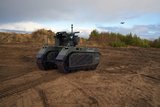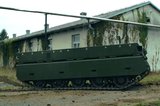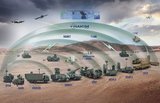Raytheon receives US Marine Corps Excalibur order
Raytheon has received an urgent operational order from the US Marine Corps for 1,037 155m Excalibur extended range, precision-guided artillery projectiles for use in Afghanistan, according to a press release issued by the company on 25 October.
Raytheon said that the US Marines (USMC) have ‘significantly increased operational use of Excalibur in the last year, firing as many as 32 rounds in one week’, and that integration of Excalibur into the regiment combat teams has given the USMC the ability to provide ‘responsive precision artillery fires across their operational zone’.
The Excalibur family of precision projectiles has been in use with the USMC and the US Army since 2007. Using GPS precision guidance technology, Excalibur provides accurate, first round, fire-for-effect capability in an urban setting. Raytheon claims that Excalibur is considered a true precision weapon, impacting at a radial miss distance of 6 meters from the target.
Lt Col Mike Milner, US Army Excalibur product manager, said of the operational need requirement: ‘the marines are using Excalibur as a critical, life-saving capability in Afghanistan. They have developed tactics to enable its use on demand and as a result, they have been able to conduct essential missions that would otherwise go unengaged’.
More from Land Warfare
-
![Estonia builds Asia-Pacific links as it looks to scale defence industry capabilities]()
Estonia builds Asia-Pacific links as it looks to scale defence industry capabilities
Collaboration between Estonian defence companies and well-aligned firms in Asia-Pacific will form a key part of Tallinn’s ambitions to significantly grow its defence industrial base.
-
![World Defense Show 2026: DOK-ING working on MV-8 variants and reveals specs ahead of Eurosatory]()
World Defense Show 2026: DOK-ING working on MV-8 variants and reveals specs ahead of Eurosatory
The Croatian company began the development of the MV-8 modular uncrewed platform in the early 2020s. Specifications for the vehicle were revealed to Shephard at World Defense Show 2026.
-
![World Defense Show 2026: Turkish and European industries will cooperate, says Aselsan boss]()
World Defense Show 2026: Turkish and European industries will cooperate, says Aselsan boss
Aselsan was formed 50 years ago in response to difficulties Turkey was facing in sourcing major systems internationally. While some challenges still remain, company president Ahmet Akyol believes a rapprochement is possible.
-
![World Defense Show 2026: MARSS displays new Nation Shield air defence C2 system]()
World Defense Show 2026: MARSS displays new Nation Shield air defence C2 system
Nation Shield is the latest iteration of the MARSS C2 system and is designed to provide C2 further forward along with more capable air defence.
-
![World Defense Show 2026: Middle East remains focused on US equipment and local industry involvement]()
World Defense Show 2026: Middle East remains focused on US equipment and local industry involvement
Vehicle procurement in the Middle East continues to target big-ticket main battle tanks, with lighter platform purchases also potentially on the horizon including tactical, infantry fighting and armoured personnel carrier vehicles.





















